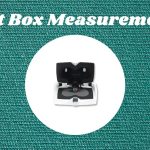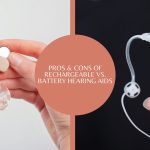The pandemic of 2020 has caused upheaval and difficulty throughout the world. Individuals, businesses and organizations have had to change their normal ways of operating in ways we never imagined. While this time has involved major shifts for everyone, those of us with hearing loss have some extra difficulties with the combination of social distancing and face masks.
We all know how helpful it is to move closer to a speaker to get to hear them better, but with six-foot distancing in place we do not wish to compromise our health, or someone else’s down the line, for the ability to hear what someone is saying.
Difficulties with Masks
Even for those with normal hearing, a mask can muffle a speaker’s voice enough to make it difficult to understand what they’re saying. We especially have trouble hearing people with high-pitched voices through a mask. The higher the sound, the easier it is for cloth material to attenuate it, so effectively we’re receiving lower sound levels on the outside of their mask compared to what is coming out of their mouth. A mask can be considered a mechanical low-pass filter, which means that it attenuates high frequencies and allows low frequencies to pass through.
The difficulties with masks don’t end with their attenuative properties. Blocking half of someone’s face makes it much more difficult to read their facial expressions, and makes it impossible to read their lips. These visual communication cues are significant for everyone, but for those of us with hearing loss they can be indispensable.
On the other side, those with aphasia or other voice problems might see their difficulties amplified by the wearing of a mask. Masks can also be uncomfortable and awkward to put on for those with certain types of hearing aids or cochlear implants.
Helpful Solutions for Mask Problems
Window Masks
One solution we’ve seen is the window-style mask, that has a clear plastic section covering the wearer’s mouth. Since the mouth can be seen through the mask, reading lips can remain a useful practice for the hard of hearing.
The problem with the windowed masks is that they’re not in wide use. For coworkers or family members of a person with hearing loss, they’re a great and considerate solution, but it’s not practical or hygienic for those with hearing loss to carry these with them to offer to strangers with whom they need to talk. If windowed masks became the norm, that would be helpful, but that seems a long way off. There is a limited inventory of FDA-approved window masks and wide adoption does not seem to be a national priority at the moment.
Disclose Hearing Loss
When talking with someone new in these times of mask wearing, it’s best to let them know right away that you have issues with hearing. This will let them know that they need to speak louder through the mask, and will help mentally prepare them for additional steps in facilitating communication between you.
Many people with normal hearing are likely to be oblivious to the measures we use to accommodate the hearing impaired, so be prepared to give an ultra-quick crash course. Ask that they speak a little louder without yelling, that they leave a pause between each word, and if you need them to repeat something, just suggest that they “rephrase” it, or “say it a different way.”
Talk-to-Text Apps
Any smartphone today can run a talk-to-text app like Otter, Ava, Microsoft Translator, or Google Live Transcribe. The iPhone “Notes” app has talk-to-text built in, as well. It is recommended that you use a microphone that connects via Bluetooth or that plugs directly into your phone which you can wipe down after each use, rather than having strangers speak directly into your phone. This helps prevent the spread of Covid-19 and other pathogens, and allows you to read what they’re saying as they’re speaking rather than having to wait until they’re done.
Hearing Aids
If you wear hearing aids, it might be a good time to make sure you’re not having moisture or wax issues that could be decreasing their functionality. If you’ve been wearing them for a while, you might wish to consider an upgrade. Some hearing aids now can reduce unwanted background noise to effectively create better than normal speech comprehension in busier environments.
If you have hearing loss but aren’t currently treating it with hearing aids, there’s never been a better time to start! Make an appointment with an audiologist through FitHearing Audiology Network today to get your hearing checked and see what hearing aids can do to improve your ability to hear in spite of the masks and long after we’ve left them behind.






